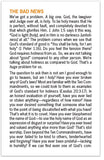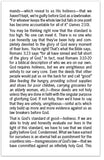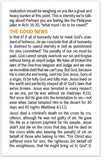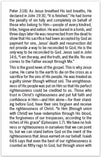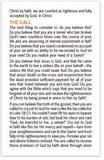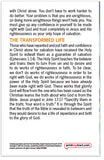How Good is Good Enough? (ESV)
Special-Order Folded Tract
 NOTE: This item is custom-printed to order (click for more details).
NOTE: This item is custom-printed to order (click for more details).
This tract is from our print-on-demand library, and is not kept in stock. Select the options below, and we will custom-print a batch just for you. Because this item is custom-printed, you can add your custom imprint to the back page at no extra cost.
- Estimated shipping date: Monday, December 1 (Click for more details)
- SKU:
- Discounts: Discount coupons do not apply to this item
- Format: Folded Tract
- Size: 3.5 inches x 5.5 inches
- Pages: 8
- Imprinting: Available with 5 lines of custom text
- Version: ESV
- Returns: Because this item is custom-printed to order, it cannot be returned.
Show all item details
The full text of this tract is shown below in the ESV version. (Do you want to print this tract in a different version than the one listed? Contact us and let us know what you're looking for—we may be able to create the alternate version for you at no charge.)
How much time do you spend thinking about eternity?
I would guess the average person spends very little time thinking about what happens when they die. The Bible teaches there are only two destinations—heaven or hell. A holding place to pay for wrongs committed is not an option. Roaming the earth as a ghost is not an option. Becoming an angel is also not an option. It is either an eternal bliss spent with the Lord in heaven or an eternal hell as punishment for sins committed.
So if these are the only two destinations, how can we know who will go where? Perhaps more importantly, how can you know where you will spend eternity? Most people associate heaven with a standard of good and hell with a failure to meet that standard. So, good people go to heaven and bad people go to hell. If this is true, we’ve got to understand the standard of good we need to be measuring ourselves against.
James 4:12 says that there is only one lawgiver and Judge, He who is able to save and to destroy. God is the only lawgiver and it is His standard of good that every person will be compared to. It does me no good at all to examine myself in light of any standard except the standard of the One who is the lawgiver and Judge. What do you think? How good is good enough to enter into an eternal heaven?
The Bad News
We’ve got a problem. A big one. God, the lawgiver and Judge over all, is holy. To be holy means that He is perfect, without fault, and completely devoted to that which glorifies Him. 1 John 1:5 says it this way, “God is light [holy], and in Him is no darkness [unholiness] at all.” The problem comes when we see that God’s standard of good is “You shall be holy, for I am holy” (1 Peter 1:16). Do you feel the tension there? God requires holiness from us. So, we are not talking about “good” compared to any other person. We’re talking about holiness as compared to God. That’s a huge problem for us.
The question to ask then is not am I good enough to go to heaven, but am I holy? Have you ever broken any of God’s laws? Most are familiar with the Ten Commandments, so we could look to them as examples of God’s standard for holiness (Exodus 20:3-17). In an honest evaluation of yourself, have you ever lied or stolen anything—regardless of how minor? Have you ever desired something that someone else had to the point of being dissatisfied with what you have? That’s what it is to covet. Have you ever blasphemed the name of God—to use the holy name of God as an expression of disgust or surprise? Have you ever loved and valued anything else more than God? That’s idol worship. Even beyond the Ten Commandments, have you ever failed to be kind to others, tenderhearted and forgiving? Have you ever been prideful—lacking in humility? If we can find even one of God’s commands—which reveal to us His holiness—that we haven’t kept, we’re guilty before God as a lawbreaker. “For whoever keeps the whole law but fails in one point has become accountable for all of it” (James 2:10).
You may be thinking right now that the standard is too high. No one can meet it. There is no one who can honestly say that they’ve been holy and completely devoted to the glory of God every moment of their lives. You’re right! That’s what the Bible says. Romans 3:23 says “for all have sinned and fall short of the glory of God.” In fact, read Romans 3:10-20 for a biblical description of who we are on our own. God requires holiness, but we are unrighteous and unholy to our very core. Even the deeds that other people would pat us on the back for and call “good” (like feeding the hungry, providing school supplies and shoes for poor children, carrying groceries for an elderly woman, etc.)—these deeds are not holy unless they are done in faith with the singular purpose of glorifying God. If not holy, then we’d have to say that they are unholy, unrighteous—sinful acts which only build up more and more evidence against us as law breakers before God.
That is God’s standard of good—holiness. If we are able to truly and honestly evaluate our lives in the light of this standard, we have to see that we stand guilty before God. Condemned. What we have earned for ourselves is an eternal hell as punishment for the countless sins—transgressions of God’s law—that we have committed against an infinitely holy God. This realization should be weighing on you like a great and heavy burden at this point. This is eternity we’re talking about! Perhaps you are feeling like the Philippian jailer in Acts 16:30, “what must I do to be saved?”
The Good News
Is that it? If all of humanity fails to meet God’s standard of holiness, do we conclude that all of humanity is doomed to spend eternity in hell as punishment for sins committed? The penalty of our sin must be paid. God cannot simply overlook our sin and forgive without being an unjust judge. We have all broken the laws of the One true lawgiver and Judge and we owe an incredible debt that we can’t pay. But God, because He is merciful and loving, sent His Son Jesus, born of a virgin, to be fully God and fully man. Jesus lived on the earth and perfectly obeyed all of God’s laws that we’ve broken. Jesus was tempted in every respect as we are, yet He was without sin (Hebrews 4:15). Not once did He give into the temptation to sin—not even when Satan tempted Him in the desert for 40 days and 40 nights (Matthew 4:1-11).
Jesus died a criminal’s death on the cross by crucifixion, although He was not guilty of sin. He gave His life as a ransom payment for His people. Jesus didn’t just die on the cross that day, but He died on the cross while also bearing the penalty of sin on behalf of those who belong to Him. “For Christ also suffered once for sins, the righteous [on behalf of] the unrighteous, that He might bring us to God” (1 Peter 3:18). As Jesus breathed His last breaths, He declared in John 19:30, “it is finished.” He had borne the penalty of sin fully and completely on behalf of those who belong to Him—people of every kindred, tribe, tongue and nation. He was buried in a tomb, and three days later He was resurrected from the dead to show that His sacrifice had been accepted by God as payment for sins. Jesus’ death and resurrection did not provide a way to be reconciled to God, He is the only way to be reconciled to God. Jesus said in John 14:6, “I am the way, and the truth, and the life. No one comes to the Father except through Me.”
This is the good news of the gospel. This is why Jesus came. He came to the earth to die on the cross as a sacrifice for the sins of His people. He was treated as a guilty sinner (though without sin). The unrighteousness of His people was put on Him so that His perfect righteousness could be credited to us. Those who trust in Christ’s righteousness and put full faith and confidence in Him—and Him alone—for their standing before God, have their sins forgiven and receive the righteousness of Christ. “In Him [through union with Christ] we have redemption through His blood, the forgiveness of our trespasses, according to the riches of His grace” (Ephesians 1:7). We have no holiness or righteousness in ourselves that we can point to, but we can stand before God on the merit of the righteousness that Jesus earned on our behalf. Isaiah 64:6 says that even the best of our righteousness is counted as filthy rags to God, but through union with Christ by faith, we are counted as righteous and fully accepted by God, in Christ.
The Call
The next thing to consider is: do you believe this? Do you believe that you are a sinner who has broken God’s laws countless times over the course of your life and are deserving of eternal punishment in hell? Do you believe that you stand condemned on account of your sin with no ability to be reconciled to God on your own? Do you realize your need of a Savior?
Do you believe that Jesus is God, and that He came to the earth to live a sinless life on your behalf—the sinless life that you could never live? Do you believe that Jesus’ death on the cross and resurrection from the dead provided sufficient payment for all of your sins that stand between you and holy God? Do you agree with the Bible which says that you need to be forgiven of all your sins and receive the righteousness of Christ by being joined in union to Him by faith?
If you can believe the truth of the gospel, then you are called to cry out to God for mercy like the tax collector in Luke 18:13. He couldn’t even lift his eyes to heaven (due to his burden of sin), but beat his chest and said “God, be merciful to me, a sinner!” Cry out to God in faith like this for His mercy and repent—turn from your unrighteousness and run to the Savior and trust fully in His righteousness to save you. Forsake your sin and desire holiness instead. You are called to receive these promises of God by faith alone through union with Christ alone. You don’t have to work harder to do better. Your problem is that you are unrighteous, so doing more unrighteous things won’t help you. You must give up any confidence in yourself to be made right with God and trust completely in Jesus and His righteousness as your only hope of salvation.
The Transformed Life
Those who have repented and put faith and confidence in Christ alone for salvation have received the Holy Spirit to indwell them as a guarantee of salvation (Ephesians 1:14). The Holy Spirit teaches the believer and trains them to turn from sin and to desire and to do works of righteousness in faith. To be clear, we don’t do works of righteousness in order to be right with God, we do works of righteousness in the power of the Holy Spirit because we have already been made right with God. These works that glorify God will flow from the one who has been saved as the Christian learns the truth about who God is from the Bible. Jesus prayed in John 17:17 “Sanctify them in the truth; Your word is truth.” It is through the Spirit that the truth of the Bible is revealed to believers and they would desire to live a life of repentance and faith to the glory of God.




